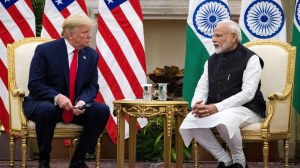Click here to follow Screen Digital on YouTube and stay updated with the latest from the world of cinema.
Credit is currency for screenwriters, but it comes ‘at the producer’s discretion’: Decoding Bollywood’s contentious contract clause
Recent ambiguity over a contentious disclaimer on the website of Yash Raj Films begs a larger question: How can a screenwriter protect their rights if the production house makes them surrender not only their script, but also their credit?
 In the land of Salim-Javed, screenwriters are now having to deal with contentious contract clauses.
In the land of Salim-Javed, screenwriters are now having to deal with contentious contract clauses.This month started with what seemed like a very inviting opportunity for screenwriters, particularly the budding ones. One of India’s biggest production houses, Yash Raj Films, launched the YRF Script Cell, a platform that allows screenwriters to submit their story ideas directly to the studio, with selected concepts potentially being developed into full screenplays for future Hindi films.
However, as soon as this noble initiative was launched, a wave of concern hit Aaram Nagar, the restless pitching ground for struggling screenwriters and other film industry aspirants in Mumbai. WhatsApp groups of screenwriters began buzzing as some members flagged the disclaimer staring into their face on the official website of Yash Raj Films.
Screenwriters vs production houses
The disclaimer claimed that any submission to the production house will become the property of YRF, unless an agreement stating otherwise is signed between the screenwriter and the studio. In the absence of such agreement, the screenwriter can’t contest the lack of attribution since the property would solely belong to YRF.
However, sources mention that this disclaimer wasn’t in reference to the YRF Script Cell, but belonged to another section of the website intended to discourage “unsolicited material” being sent to the studio. However, irrespective of the intent, several screenwriters were alarmed that the contentious clause can be potentially used against their interests.
As per the same sources, the Screenwriters Association of India sprang to action promptly and advised YRF to take down the disclaimer from their website to avoid confusion and ambiguity in light of their new initiative. The sources later told this writer that the disclaimer resurfaced on the YRF website the following week, before being taken down yet again by the studio hours later.
Both YRF and SWA declined to comment on any activity or update pertaining to the YRF Script Cell. But the contentious disclaimer begs a larger question: can screenwriter rights be infringed upon in case they knowingly or unknowingly sign on the dotted line of a contract that carries such a disclaimer. Or are such agreements inherently null and void? If not, how can screenwriters protect their rights from ethically ambiguous contracts?
“The easy answer is they can’t. Whether we like it or not, the interests of the film industry are still skewed towards the big production houses who prefer stars to scripts. They call the shots because they have not only the resources, but also the power to greenlight projects,” says a screenwriter who’s just about found their footing in the industry after eight years of knocking doors.
Let’s be clear: Disclaimers like these aren’t exclusive to YRF, but have also been flagged in contracts by towering studios like ZEE and streaming giants like Netflix and Prime Video. Script cells or script development centres have been launched in the past too, but the clause regarding credit is more often than not “worrying worded” or not “particularly reassuring.”
“Why just new writers? Even after so many years of writing for projects that have been successfully greenlit, I still shudder at the thought of signing a contract. What if my interests aren’t protected? SWA and other support groups are bringing change, but maybe I’ve seen too much to hope for 100% assurance every time,” says writer-director Sulagna Chatterjee.
Advantage production house
As someone who herself runs a WhatsApp group of hundreds of female professionals working in the Indian film industry, Sulagna points out two extremely basic precautions any and every screenwriter must take before initiating any agreement with a production house. “First of all, get that script registered with the SWA. By now, every writer should be aware of these basics. Register not just the script, but also the concept note or any such original material that can be potentially exploited,” she says.
Sulagna also advises screenwriters to not send the script or concept note in its original form to the studio, script cell or production house. “Always send a varied version, so that the original stays with you. Of course, there are only so many fundamental story ideas and constructs in the world so there are bound to be overlaps. But in case you find yours has more than an eerie similarity, you can always furnish the original version to contest your claim,” she adds.
Another unanimously recommended prerequisite for negotiating contracts for screenwriters is to loop in a lawyer at every stage. “I understand that not too many writers, let alone new writers, can afford a lawyer for every contract. But in that case, you can reach out to SWA. They can provide legal counselling, in several cases on a pro-bono basis,” says another writer who has benefitted from roping in SWA as the mediator.
Clause says screenwriters can’t complain
Sehaj Kaur Maini, whose co-written shows like Please Find Attached and Gandhi, underlines a prevalent and absurd clause that’s part of screenwriter contracts these days, stating that in case the screenwriter has a grievance or objection to how they’ve been credited, they can’t approach bodies like the SWA for redressal.
“They’re basically stripping you off the right to even object to your unfair treatment. It’s so absurd but so common, I can’t even tell you. That’s why it’s ideal if you take legal advice before signing a contract, and not after signing one,” says Sehaj. But are these contracts even legally enforceable? Don’t they infringe upon the rights of a screenwriter? Should they not be null and void?
Sanjay Vasudevan, a Media and Entertainment Lawyer, who also represents the legal interests of the SWA, confirms that in case of exploitation after signing such a contract, a screenwriter can still go to the SWA for assistance. But it won’t bear the same effect as in the case they approach SWA prior to their dealings. “In the former case, the production house or the other party can refuse to entertain SWA as the arbitrator. Because the writer themselves have waived off the right to include a third party in their negotiations,” argues Vasudevan.
Another bizarre contractual clause that screenwriters are often at the mercy of is that they’ll be given credit for story, screenplay, and/or dialogues “at the producer’s discretion.” “While this makes sense on a practical level, it makes even more room for exploitation given how vague, reckless, and even credit-hungry some of our producers are,” says a senior screenwriter.
The Mrs omission
It wasn’t too long ago that actor Harman Baweja’s Baweja Studios and Jio Studios had omitted the credits of all HODs, including screenwriters, in the first trailer of their critically acclaimed ZEE5 film Mrs, directed by Arati Kadav. A technician closely associated with the film tells SCREEN that while that omission was rectified with a new, shorter trailer hours later, it was far from an “unintentional mistake” as claimed by the film’s team. “The rot runs deeper. Its original film, The Great Indian Kitchen, was a raging success. So, it’s no coincidence that the producer (Baweja) has taken a co-writer credit along with the actual co-writer of the film (Anu Singh Choudhary),” they say. Again, it’s no coincidence that the screenwriter and director of the original Malayalam film, Jeo Baby, was also omitted from the first trailer.
 The HODs, including the screenwriter, weren’t credited in the first trailer of Sanya Malhotra-starrer Mrs.
The HODs, including the screenwriter, weren’t credited in the first trailer of Sanya Malhotra-starrer Mrs.
Karan Johar on producers/directors taking writing credits
On the Game Changers podcast recently, filmmaker Karan Johar had chided other producers for usurping the credit from screenwriters or arbitrarily adding their own names to Story and Screenplay just because they’ve creatively contributed to the film. “Isn’t that your job?” asked Johar, who was happy to give the story idea of his latest directorial, Rocky Aur Rani Kii Prem Kahaani (2023), to co-writers Ishita Moitra, Shashank Khaitan, and Sumit Roy to develop it into a full-fledged screenplay. His banner Dharma Productions was also among the first to include screenwriting credits on first posters (Nikhil Mehrotra and director Sharan Sharma for Gunjan Saxena: The Kargil Girl) and for crediting Somen Mishra, its Head of Creative Development, as co-producer.
 Karan Johar came up with the story of his latest directorial, Ranveer Singh-starrer Rocky Aur Rani Kii Prem Kahaani, but didn’t take additional credit.
Karan Johar came up with the story of his latest directorial, Ranveer Singh-starrer Rocky Aur Rani Kii Prem Kahaani, but didn’t take additional credit.
But only a few production houses are as generous despite their lofty image as harbingers of progressive, ethical cinema. For instance, in a short film of a 2021 romantic anthology on Netflix India, the director was given “additional screenplay” credit even though he came onboard the project at a much later stage of pre-production than the writer. Even worse, a seasoned screenwriter adapted a popular documentary into a film hoping for it to become his sophomore directorial. But his co-writers, who also co-produced the project, conveniently appointed one of them as the director to bank on a sound screenplay.
From Salim-Javed to now
“But you have to understand that whether it’s a writer big or small, they’re too isolated and powerless to call out these practices. It’s unfortunate that we’ve come from a legacy of Salim-Javed, who wrote the hard-hitting dialogue “Main gire hue paise aaj bhi nahi uthata,” to a time when peanuts for compensation are slapped on a writer’s face in exchange of not only their labour and skill, but also the right to associate their name with that material. Let intellectual property go take a hike,” rants another senior screenwriter.
 Salim-Javed’s legacy is getting diluted thanks to contentious contract clauses for screenwriters.
Salim-Javed’s legacy is getting diluted thanks to contentious contract clauses for screenwriters.
“Nobody wants to be the writer because it’s a lot of hard work and is a thankless job. But after a project becomes successful, everyone and their grandfather wants to attach their name to the writers room,” laments a screenwriter whose credit for his most acclaimed work to date was usurped by the boutique production house that earned tremendous goodwill from that project. “I don’t get it, how can ‘Created by’ credit can go to a production house? How can eight people create a show? The creator is always one or two, and more people join in as co-writers,” he says.
The concept of a “showrunner” hasn’t yet found resonance in the Indian streaming ecosystem yet. Vikramaditya Motwane is the only prominent one that comes to mind, for Sacred Games on Netflix India. “Honestly, that’s one less position to take the screenwriter’s credit for,” says a writer, who claims the hierarchy of a writers room is also becoming more and more murky as more cooks enter the picture. Sample this upcoming historical show, based on a renowned academician’s books, where the script doctor has been given a higher pecking order than a young screenwriter who’s invested months of their skills and labour into the project.
In case of error, writer must indemnify producer
But when it comes to bearing the cost of the written word, none of these snatching stakeholders — the production house, the producer, the director or the script doctors and such — bear the burden or come to the writer’s rescue. The “credit at the producer’s discretion” clause is strategically accompanied by an “indemnity” clause — if your script is plagiarized, factually incorrect (in case of a biopic or story based on true events), or misrepresentative of the subject in question, the writer must indemnify the producer for that lapse.
“It’s a cruel clause because in many cases, it’s the producer themselves who suggest changes to the script. The writer has no choice but to incorporate that feedback in order to clear their tranches of compensation which are already too delayed and uncertain in the industry,” says Vasudevan. He’s personally come across cases where the writer has been held accountable for factually incorrect details in the biopic of a celebrity, even though it’s the producer who provided all the research for the subject.
“That time isn’t far when producers take entire scripts from writers and make mock films using Artificial Intelligence to see if they have any potential or not,” says a disillusioned screenwriter. As if the odds aren’t stacked against the screenwriter already, the looming threat of AI would only make matters worse. “Yes, AI will affect everybody, and not just writers. But unlike writers, actors and technicians can just up and leave if they don’t agree with the producer’s terms,” he says, adding, “A writer has spent years on their baby. If they’re made to choose between compensation and credit, it’s already half the battle lost.”




- 01
- 02
- 03
- 04
- 05






























